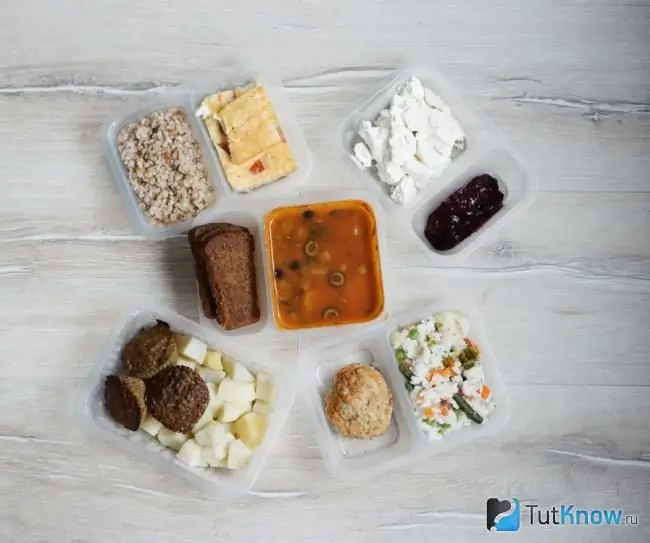- Author Arianna Cook [email protected].
- Public 2023-12-17 14:23.
- Last modified 2025-01-23 09:40.
What is intermittent fasting, the benefits and harms. Basic rules and menus, results and reviews of those who are losing weight.
Intermittent fasting is a diet that involves not eating for a specific period of time. When properly observed, it helps the body to establish the work of internal organs, which has a positive effect on overall health and leads to weight loss.
What is Intermittent Fasting?

Fasting is a natural process that takes place in the body to cleanse. At this time, he forms protective reactions and begins to actively burn the fat layer and eliminate all sorts of "debris" from the body - toxins, toxins, decay products. This practice makes the body healthier, improves skin condition, well-being and quickly removes excess fat.
Intermittent fasting is about avoiding food for a period of 12 to 24 hours. There are several modes of nutrition:
- 16/8 … This is the standard intermittent fasting regimen. 16 hours is fasting, and the remaining 8 are filled with meals. It is important to observe the daily calorie content: you cannot be undernourished so as not to worsen the condition of the body, as well as overeat, otherwise there will be no result from fasting. You can choose any time to start. For example, from 8 to 16:00 you do not eat anything, and the rest of the time you use to eat. The main thing is to achieve the highest possible comfort.
- 14/10 … Practice for beginners in intermittent fasting. This option is not as tough and is used to avoid a lot of stress. It can even be called the golden rule of “don't eat after 6”. It turns out that the last meal falls at 17: 00-17: 30, and then the fasting period begins.
- 20/14 … This option is already suitable for experienced losing weight who want a stronger effect. You can eat, for example, from 14:00 to 18:00. This mode is convenient for those who are used to giving up breakfast and eating twice a day.
- 23/1 … It will take a lot of willpower to survive 23 hours without food. This mode is suitable for those who want to achieve maximum results. Such fasting can be carried out once a month.
- 5:2 … It's also a pretty tough regime, absolutely unsuitable for beginners. He assumes two days without food. At the same time, on the remaining 5 days, when you can eat, you need to reduce the usual daily calorie intake by 2 times. You can use this method of losing weight no more than once every 2 months, as it is very stressful for the body.
Good to know! In one month on intermittent fasting, you can lose from 7 to 10 kilograms: it all depends on the chosen diet and the general calorie deficit.
You cannot start intermittent fasting without special training. Start gradually reducing your daily calorie intake, for example, slightly reduce your usual portions.
Also, before starting a diet, be sure to consult your doctor. You may not be aware of some diseases for which intermittent fasting is strictly prohibited.
The benefits of intermittent fasting

The main advantage of intermittent fasting is the minimum dietary restriction. At the same time, the result is incredible: excess weight quickly leaves and does not return.
Why Intermittent Fasting Is Good For:
- Acceleration of body processes … During fasting, some changes occur in our body: the amount of insulin in the blood decreases and the process of burning the fat layer begins. It also quite strongly affects hormones, which also contribute to fat burning, and in addition, affect muscle growth. The cells of the body during starvation begin to quickly renew themselves, which affects its general condition and the quality of the skin.
- The metabolism is accelerated … The undoubted benefit of intermittent fasting in weight loss is the acceleration of metabolism by up to 14%. A fast metabolism also contributes to the rapid burning of fat. This effect appears not only during the fasting period, but also persists in the future.
- Improves skin … Fasting increases the level of free radicals in the body. They influence the quality of our skin and help it stay young and fresh.
- Disease risks are reduced … Fasting reduces the likelihood of heart disease, cancer, and diabetes.
Important! If you play sports, then distribute meals so as not to feel excessive hunger. Fill your diet with plenty of protein and vitamins. Buy protein-based sports drinks and multivitamins if needed.
Intermittent fasting has a positive effect on brain function and fills the body with energy and improves performance. But it also has some downsides.
Harm and contraindications of intermittent fasting

We can talk about the dangers of intermittent fasting if such a regime is not suitable for a person, or if it is carried out often or incorrectly.
Intermittent fasting is not suitable for people who suffer from:
- immune diseases;
- violation of processes in the liver and kidneys;
- diseases of the gastrointestinal tract;
- nervous diseases, excessive predisposition to stress.
Intermittent fasting is not suitable for women during pregnancy and lactation.
Intermittent fasting is also forbidden for people who need to eat fractionally due to a therapeutic diet. In no case should you violate the treatment in order to lose weight: it is better to pay attention to other diets or try to reduce the daily calorie intake.
You should not ignore the fact of poor health against the background of intermittent fasting. If your condition worsens, stop your diet and see your doctor if necessary.
Basic rules of intermittent fasting

In order to prevent negative consequences, it is important to observe intermittent fasting within the framework of the rules:
- Daily calorie intake … It is important to calculate the daily calorie requirement for your height and age. A correctly calculated calorie deficit will not spoil the state of the body and will help to get rid of excess weight.
- Suitable mode … Choose the most comfortable time for intermittent fasting and distribute meals in a convenient way. Remember to keep your daily calorie intake, so act wisely. In order not to feel severe discomfort, you can divide meals into 2-3 times, arranging periodic snacks.
- Good nutrition … Of course, there are not many restrictions on this intermittent fasting diet. If you like to eat a hamburger or chocolate bar, then you can easily have a snack with them as part of the daily calorie intake. But it is important to remember that a balanced diet will affect the body much better than fast food and sugar. Empty carbohydrates will quickly dissolve in the body, and you will quickly become hungry. Therefore, it is better to give preference to complex carbohydrates - oatmeal or buckwheat, protein - lean turkey and chicken, low-fat milk, cottage cheese, kefir.
- Water … It is important to consume enough water, filtered or purchased from a store. The average rate of water consumption per day is 1.5-2 liters. Do not replace it with tea or other drinks - the body really needs clean water.
- Do not overdo it … Frequent fasting will not help the body; on the contrary, it will drain it. This will affect both the physical state and the psychological.
Important! Remember comfort. If you feel really bad about intermittent fasting, this may not be your diet option.
See allowed and prohibited foods on the Lesenka diet
Intermittent fasting menu
It is important to use as many of the right foods as possible in your diet. Yes, it is allowed to eat both sweet and starchy foods on a diet, but remember that it is important not only to lose weight quickly, but also to keep the body in a healthy state. A balanced diet not only improves health, but also affects the quality of the skin.
We offer several menu options for intermittent fasting:
| Breakfast | Snack | Dinner | Dinner |
| Oatmeal with dried fruits or berries | Any fruit | Vegetable soup | Boiled chicken breast |
| Oatmeal (2 tablespoons oatmeal, some low-fat milk, and one egg) with nuts | Whole grain loaf with low-fat cheese | Buckwheat with chicken | Baked Lean Fish Fillet |
| Low-fat cheese bread and sweetened tea or coffee | Glass of freshly squeezed orange juice | Serving of oatmeal with fruit or berries | Boiled chicken breast |
| Low-fat cottage cheese with herbs or fruits | A glass of low-fat kefir | Rice porridge with low-fat milk | Baked beef steak |
The proposed options can be mixed with each other to taste. The main thing is to select the amount of food within the framework of your daily calorie content. By the way, you can drink tea or coffee during intermittent fasting at any time of the day. The main thing is to use them without additives, with the exception of a sweetener or, in the case of tea, lemon juice.
Important! Try not to use a lot of oil and salt. Oil is a very high-calorie product, and an excessive amount of salt provokes edema.
It is also worth getting out of the fasting mode carefully. For example, if you skipped breakfast, start drinking water in the morning, eat a light vegetable salad a little later. If you have been starving for a whole day, then the next day you need to eat light meals, steamed vegetables and various cereals, dairy products. Gradually add more complex dishes to your diet.
Intermittent fasting results and feedback

The results of intermittent fasting for weight loss were clearly demonstrated by such a German study: a group of people used intermittent fasting for 12 weeks, maintaining a daily calorie deficit. At the end of the experiment, it was found that the subjects lost several kilograms, and their physical indicators of health increased. So, the level of sugar in the blood became lower, the condition of the cardiovascular system improved. The subjects claimed that they began to feel more alert and energized.
The effectiveness of intermittent fasting is confirmed by the reviews of those who have lost weight:
Inna, 27 years old
For three months I sat on intermittent fasting with a 16 to 8 regimen, more familiar to everyone as "not eating after six." The effect is really there, the weight flies away before our eyes, the condition improves, you feel more cheerful. However, if you return to your usual diet without correcting it, the excess weight will quickly return. So I kept my fasting calorie deficit. As soon as I achieved the desired weight, I began to maintain the same calorie rate.
Oksana, 33 years old
A year ago I read a lot of reviews about intermittent fasting and now I can't imagine my life without it. This is not the first time I use it, because it is difficult for me to keep the required calorie intake per day. I already have a very sweet tooth, so I periodically gain extra weight. At such moments, the intervalka saves you. Depending on how much I gained, I use the 16 by 8 or 20 by 4 mode. By the way, the skin on fasting becomes very cool.
Maria, 35 years old
I tried this diet for the first time, because I saw enough beautiful photos before and after intermittent fasting. This inspired me somehow, and even promised that the energy would appear and the condition of the skin would improve. I tried 14 by 10, and it was still difficult to frame myself and not eat when you want. Moreover, I go in for sports, and after classes I really want to eat. But still, I somehow adjusted it, and there are results: the excess weight really goes away, well, slowly for now, because I am not yet used to eating less. I plan to switch to 16: 8 and reduce the number of calories.
What is intermittent fasting - see the video:

Intermittent fasting is an effective diet that promotes rapid weight loss, improved skin and overall health. It is important to choose the right time period for yourself and maintain a daily calorie deficit, then the diet will bring results. In general, you can lose up to 1 kilogram per day. After completing intermittent fasting, it is important to maintain the correct daily calorie intake so that the weight does not come back.






